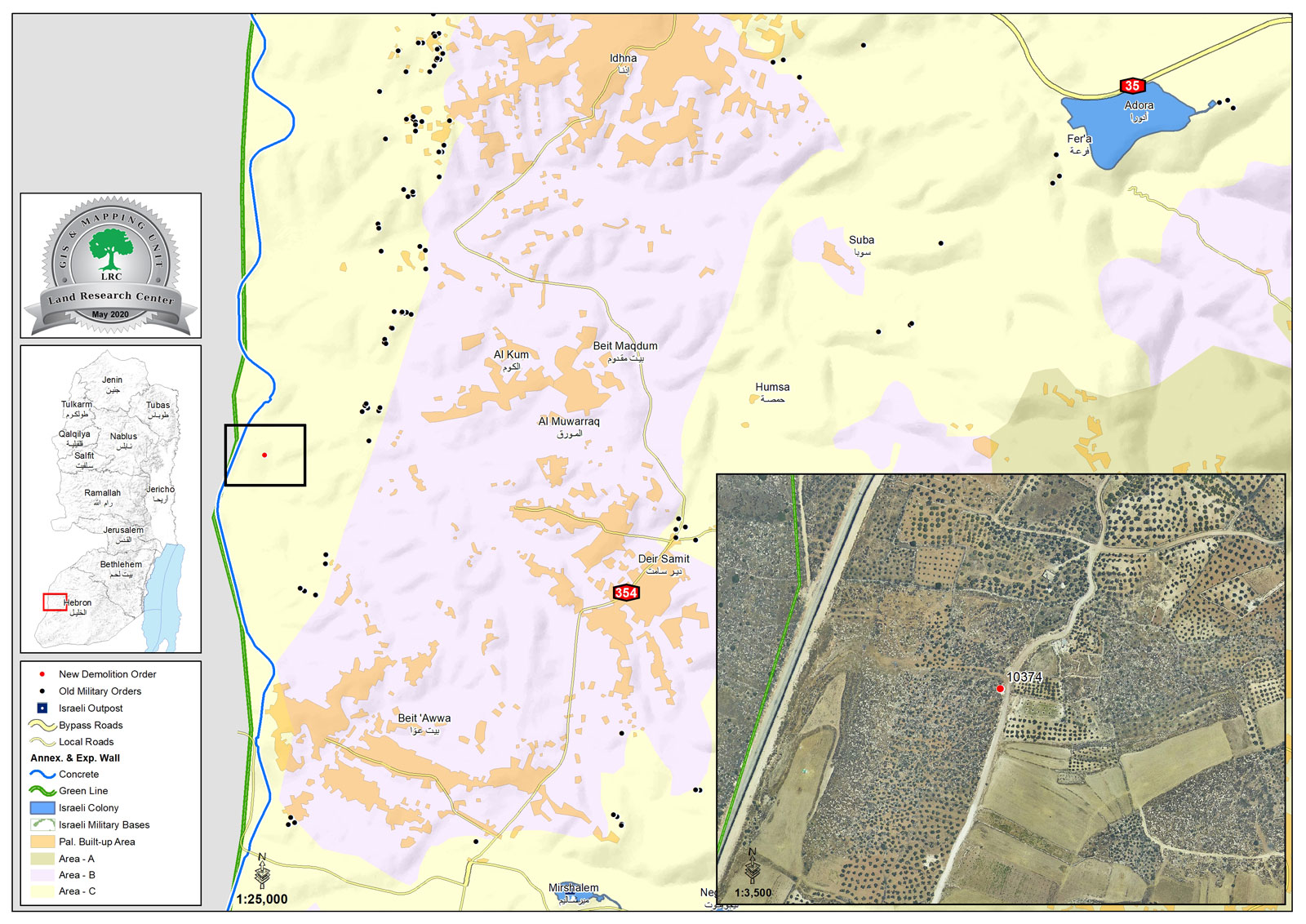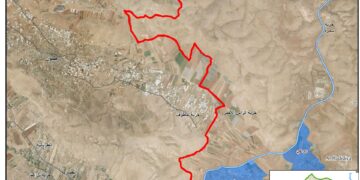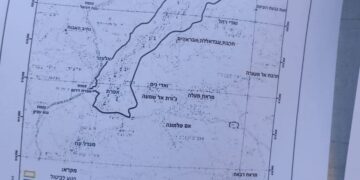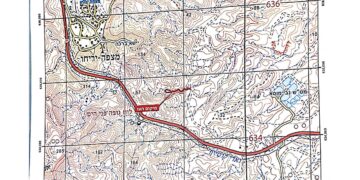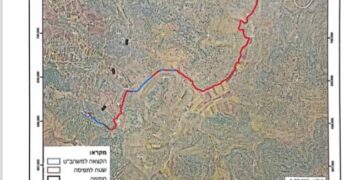- Violation: “96 hours” notice to remove agricultural facilities.
- Violation Date: 04/5/2020.
- Location: Ashbour – Deir Samet Village / Hebron Governorate.
- Perpetrator: the so-called Israeli Civil Administration.
- Affected person: Adnan Al-Hurub.
Violation details:
The Israeli occupation authorities handed over citizen Adnan Khalil Oudeh Al-Hurub a notice to demolish and remove his a cistern, retaining walls and a container within 96 hours under the pretext of un-licensing in the town of Deir Samet, west of Hebron.
The affected citizen reported to the Land Research Center’s researcher the following:
” A vehicle belonging to the so-called Civil Administration, accompanied by a patrol of the occupation army, raided the “Ashbur” area, west of the town, on 5/5/2020 and arrived at my land. The so-called Israeli buildings inspector wrote a notice and placed it on a cistern whose I got built recently and took picture of it before leaving the site”.
 Copy of notice No. 10374 targeting Mr. Al Hurub’s agricultural project
Copy of notice No. 10374 targeting Mr. Al Hurub’s agricultural project
The notice was entitled “Removing a Building” bearing the number (10374), calling for the demolition of the facilities within a period of 96 hours from the date of issuance.
The following are more details about targeted facilities:
- A cistern for agricultural use: it was built 7 months ago with a total capacity of 110 M3. It was was a gift from the Palestinian Ministry of Agriculture as the farmer owns a piece of land planted with olive seedlings.
- metal container”: the citizen had placed it on his land to be used as a store.
- A 100 meter long retaining walls that were set up around his land.
The occupation authorities based their notice on the military Order No. 1797 of 2018, which targets unfinished or uninhabited Palestinian buildings, and is considered one of the most dangerous military orders issued by the Israeli occupation in the occupied West Bank. The following is more information about this arbitrary military order:
Military order No. 1797:
The Coordinator of Israeli Government Activities in the Occupied Territories (COGAT) issued military order 1797 on 17 April 2018. COGAT, under the direct control of the Israeli defense ministry who runs civil affairs in the occupied West Bank. Order 1797 will go into effect on 19 June 2018.
This military order makes it possible for Israeli forces to demolish Palestinian homes deemed as “new” in Area C within 96 hours of a demolition order or removal notice being issued which “blatantly violate international law and contravenes existing local legislation.
According to the military order, “new structures” are those identified by an Israeli ” Civil” Administration (ICA) inspector as having been built within the previous six months, or inhabited for less than 30 days prior to the removal notice. The only way to prevent the demolition is to produce a valid building permit or provide evidence that the targeted structure is not “new” within the meaning of the order.
The new order severely restricts the right to a hearing or the opportunity of appeal. According to the planning regulations applicable in Area C, the first enforcement measure against an unlicensed structure is a stop-work order, which gives the owner 30 days to object and try to obtain a building permit retroactively. If this fails, (COGAT) may issue a final demolition order, usually due for implementation within two to four weeks.
Military Order 1797 allows the Israeli Military Commander to summarily destroy Palestinian structures – including those provided as humanitarian assistance – with virtually no legal recourse available to those whose homes will be destroyed. No access to justice and no protection from grave breaches of IHL.
Military order says Palestinians have 96 hours to appeal house demolition
Even if Palestinians fulfill the appeal requirements put in place by military order 1797, Israeli authorities maintain complete authority to proceed with demolition.
Under the order, COGAT excuses itself from informing Palestinian homeowners directly that their homes are slated for demolition. The Israeli authorities only require demolition orders be placed “next to” relevant structures 96 hours before Israeli forces arrive to execute demolition. If a homeowner does catch wind of an impending demolition, he or she must present an approved master plan and building permit to appeal the demolition. Israel’s discriminatory housing policies in the West Bank ensure that this is an almost impossible requirement for the 300,000 Palestinians living in Area C, 60 percent of the West Bank, to fulfill. For example, between 2010 and 2014, Israel approves 1.5 percent of building applications in Area C. Israeli authorities, however, routinely approve of settlement master plans and even halt demolitions of settler outposts citing the existence of master plans. Indeed, since 2017 Israeli officials have approves nearly 14,000 settlement units in the West Bank.
In addition to having to produce an approved master building plan within four days, Palestinian residents of Area C attempting to forestall demolition must prove that construction on their home or home addition has been completed for six months or that the structure has been inhabited for thirty days.
By requiring that Palestinians produce so many documents in such a short period of time, this military order “virtually strips the affected residents of the right to due process and the capacity to challenge the demolition orders through legal avenues, by requiring that objections to the demolition order be accompanied with a valid building permit. Moreover, COGAT remains the sole arbiter of these appeals. Put differently, even if Palestinians fulfill the appeal requirements put in place by military order 1797, COGAT empowers itself to proceed with demolition anyway.
A glimpse on Deir Samit “Al Yasiriya”:
Deir Samet is located 13 km southwest of the city of Hebron, and according to the local authorities it is within the “Al-Yasiriya” area, and is surrounded on the northern side by the village of Al-Samiya, on the east by the village of Tarousa and the town of Dura, on the west by the 1967 borders, and from the south by the villages of Beit Awa and Wadi Ubaid. It had a population of 8,114 people according to 2017 census. Its total area within the Yasiriya community is 22,273 dunums of which 717 dunums are a built-up area.
Two colonies were built on its land; the first of which is Mershalim, on a total area of 40.5 dunums; and the second one is Nijhaot, which was built on 112 dunums, and nowadays inhabited by 134 settlers.
On the other hand, bypass road No. 3265, which connects the Jewish colonies with Israeli proper, was built on 413 dunums of the village land. Not to forget the Expansion and Annexation Wall whose construction, in that particular area, was built at the length of 4,143M. This, eventually, led to the looting of about 414 dunums under its path, in addition to isolating 350 dunums behind it.
The lands of Yasiriyah are classified into areas B and C according to the Oslo Accords. Areas B formed 54% – 12,016 dunums- of the total village area, and the remaining 46% are classified as areas C amounting to about 10,251 dunums.

